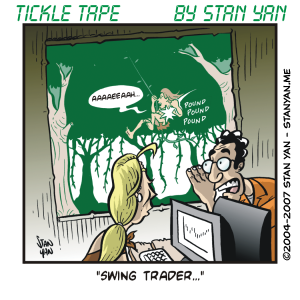Jim asks his friend, Marty, “Where have you been? I’ve been waiting for 15 minutes. They are ready to give our lunch reservations away.” Marty nervously replies, “Sorry Jim. I was waiting in line at the ATM. Everyone thought one of the ATM machines was broken, so we waited in line at the single machine that we believed to be working. Luckily, there was a young man in a rush who tried the other machine. It was working all along. We just assumed it was broken.
We would have been waiting another 15 minutes if it weren’t for that young man who couldn’t wait.” Jim thinks, “No wonder this guy can’t trade. He just follows the crowd.” Jim challenges Marty, “Why didn’t you see if the other ATM machine was working yourself? Why did you wait?” Marty replies, “I didn’t want to make a scene. It would be embarrassing if it turned out I were wrong. It was better to wait.” Marty is a conformist, and extreme conformity is a trader’s worst enemy.
Marty typifies conformity at its worst. He cares what other people think. He is afraid to take a reasonable risk that has only minor potentially negative consequences. He doesn’t take initiative. Am I making too much of a minor everyday situation? I don’t think so. This act of conformity illustrates how the masses blindly react to the ups and downs of the markets. Why does the typical trader conform? First, the conformist is overly concerned with issues of self-presentation. He or she is interested in looking good.
This concern with making the “right” impression has been programmed into his or her psyche from childhood. It is so pervasive that the person is always worrying about making a good impression even when it is not necessary. He or she may hold on to a losing trade, for example, to save face. Or he or she may unconsciously think, “I don’t want to do anything too innovative and feel like I need to explain it to my friends. I might come off as a fool.” In the end, who cares what anyone thinks? If you have trouble with conformity, it’s vital to look inward for what you want to do. Don’t let other people determine what you want to do.
Second, the typical trader is afraid of taking a risk. Again, there’s a fear of shame that lies behind conformity. The conforming trader needs to be right. The worst thing he or she can do is take a risk, fail, and face the consequences. So what if you fail? Everyone fails. Ask any successful person and you’ll find more failure than success. Babe Ruth struck out many times before setting world records. Matt Leinart’s passes are sometimes intercepted, and Reggie Bush doesn’t always break through the defence.
The Bee Gees have a host of records that no one even bothers listening to, and Thomas Edison had failed inventions before he stumbled upon a way to make the light bulb. Failure is inevitable if you are seeking success. The winning trader isn’t afraid of failure, looking bad, or taking a risk.

